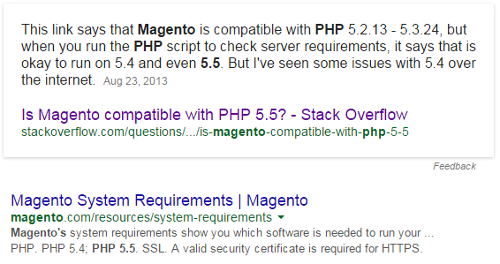Recently we wrote a post on how Google was placing bad instruction for upgrading Zen Cart directly in the search results. We have run across another example of where Google isn’t providing a good answer. If you do a search for “Magento PHP 5.5” currently you get the following answer above the normal search results:

Unlike the Zen Cart upgrade example, the information isn’t wrong, it just out of date. If you following the link referenced in that answer you are taken to the Magento System Requirements page which now lists the latest version of Magento, 1.9.1, as being compatible PHP 5.4 and 5.5 (as we mentioned in a previous post, as of Magento 1.9.1 the bare minimum it will allow being run on is 5.3.0).
The Magento System Requirements page was the first result when we did the search:

So excluding a direct answer would have produced a better result in this case (by comparison the page Google took their answer from was ranked 7th).